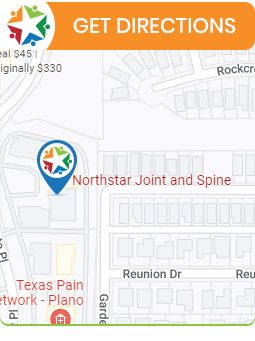What to Expect When Seeing a Pain Management Doctor in Plano, TX
Pain management is essential for improving comfort and restoring function when pain interferes with daily life. When seeing a pain management doctor like Board Certified Dr. Robert J. Nocerini, MD, at Northstar Joint and Spine, you can expect a comprehensive evaluation. Based on this assessment, our team will discuss treatment options tailored to your needs, aiming to alleviate pain and improve your overall mobility. For more information, please contact us today or schedule an appointment online. We are conveniently located at 7704 San Jacinto Pl Suite #200 Plano, TX 75024.




Table of Contents:
How do you know when pain is serious?
What should I expect on my first visit to a pain management clinic?
What are the different types of pain management?
What to Expect When Visiting Dr. Robert Nocerini, Pain Management Specialist, at Northstar Joint and Spine in Plano, TX
Pain management clinics specialize in providing relief for chronic pain through various treatments such as injections, physical therapy, behavioral therapy, and other procedures. They are often the first choice for those experiencing long-term pain, including individuals with conditions like cancer or chronic conditions. These clinics often provide more effective pain relief compared to other medical centers focused on acute pain. Many pain management clinics prioritize cost-effective care with treatments that are both safe and highly effective.
Most types of pain are short-term (acute) and mild, not lasting longer than a few days and causing minimal discomfort. However, in some cases, pain can be serious, and should receive immediate medical attention; signs of serious pain include:
• Persistent fevers
• Unexplained weight loss
• Blood in the stool or urine
• Progressive numbness or weakness in the legs
• Inability to urinate or pass stool
• Loss of bowel/bladder control
• Pain at night
• Sexual dysfunction
• Balance problems
• Pain not alleviated/worsened by different positions
• Recent IV drug use
• Progressive worsening of pain despite relative rest
At the first visit, patients undergo an evaluative process that typically involves:
• A physical exam
• Interview about medical history
• Pain assessment
• Diagnostic or imaging tests
A good multidisciplinary clinic will pay equal attention to all of the patient’s history and needs, including medical, psychiatric, social, emotional, familial, and psychological; that is the only way to assess patients thoroughly. Pain management is also a key component, ensuring that physical discomfort is addressed alongside other aspects of well-being for a holistic approach to care.
The different types of pain management directly correlate to the type of pain that is being addressed, such as acute or chronic pain.
Acute Pain: Acute pain is a type of pain that occurs when the tissues in the body are exposed to a stimulus, such as an inflammation, or infection. Acute pain is often the body’s way of protecting itself, alerting us that something is wrong. Acute pain can vary in intensity and often has a specific cause and a finite duration.
Chronic Pain: Chronic pain is pain that persists or continues for a long period, typically longer than six months; it has a variety of causes, such as arthritis, and nerve damage. Chronic pain is often very painful and can affect a person’s ability to work, sleep, and enjoy activities with friends and family.
Neuropathic Pain: Neuropathic pain is a type of pain caused by damage to the nervous system, usually as the result of an illness. It is different from nociceptive pain, which occurs when there is tissue damage. Neuropathic pain is often described as a “pins and needles” type of pain (medically known as paresthesia), but can also be very sharp or burning.
Nociceptive Pain: Nociceptive pain is the most basic type of pain and is caused by tissue being damaged or altered by internal or external stimuli, such as toxin, or temperature change. Nociceptive pain serves an important protective function, signaling the body to avoid stimuli that cause further damage. Nociceptive pain can be either acute or chronic, depending on the cause and the body’s ability to respond to it.
Radicular Pain: Radicular pain is the sensation of pain that radiates down the lower extremities when the nerve root is affected; it can be caused by a herniated disc, spinal stenosis, or a pinched nerve. Radicular pain can range in intensity from a dull ache to severe pain that radiates down the legs or into the arms. Some people with radicular pain experience burning, tingling, or electric shock sensations in their lower extremities.
When visiting Dr. Robert Nocerini, patients experience a patient-first approach emphasizing clear communication and trust. The visit begins with a discussion of symptoms, medical background, and previous treatments to gain a full understanding of each case. His diagnostic precision helps identify pain sources quickly and accurately.
At Northstar Joint and Spine in Plano, TX, Dr. Nocerini develops a comprehensive care plan combining evidence-based therapies and modern pain-relief techniques. Each plan is customized to enhance mobility, decrease discomfort, and promote long-term wellness. His compassionate and detail-oriented care ensures patients feel supported throughout their treatment journey.
Pain can be difficult to deal with, but the pain management specialists at Northstar Joint and Spine are here to help. Contact us today to book an appointment with one of our pain management specialists. We look forward to serving you! We are conveniently located at 7704 San Jacinto Pl Suite #200 Plano, TX 75024. We serve patients from Plano TX, Willow Bend TX, Frisco TX, Allen TX, Addison TX, North Dallas TX, and surrounding areas.

Check Out Our 5 Star Reviews


Additional Services You May Need
▸ Back Pain
▸ Shoulder Pain
▸ Chronic Pain
▸ Epidural Steroid Injections
▸ Spinal Cord Stimulation
▸ Viscosupplementation
▸ Genicular Nerve Blocks
▸ Facet Injections
▸ Joint Injections
▸ Sacroiliac Joint Injections
▸ Lumbar and Cervical
▸ Facet Medial Branch Blocks
▸ Diagnostic Nerve Blocks
▸ Medication Management
▸ Neck Pain Doctor
▸ Diabetic Peripheral Neuropathy
▸ Headaches
▸ Suboxone
▸ Peripheral Nerve Stimulation
▸ Spine
▸ Joints
▸ Muscles
▸ Bones

Additional Services You May Need
▸ Back Pain
▸ Shoulder Pain
▸ Chronic Pain
▸ Epidural Steroid Injections
▸ Spinal Cord Stimulation
▸ Viscosupplementation
▸ Genicular Nerve Blocks
▸ Facet Injections
▸ Joint Injections
▸ Sacroiliac Joint Injections
▸ Lumbar and Cervical
▸ Facet Medial Branch Blocks
▸ Diagnostic Nerve Blocks
▸ Medication Management
▸ Neck Pain Doctor
▸ Diabetic Peripheral Neuropathy
▸ Headaches
▸ Suboxone
▸ Peripheral Nerve Stimulation
▸ Spine
▸ Joints
▸ Muscles
▸ Bones






